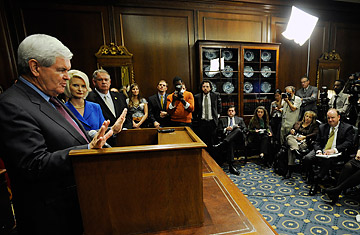
Former House Speaker Newt Gingrich holds a news conference in Atlanta on March 3, 2011
It's been quiet in Iowa but Newt Gingrich's tiptoe toward entering the wide-open race for the 2012 Republican presidential nomination may finally perk things up. "That probably gets the other candidates to get serious about setting up a political operation here," says Steve Scheffler, president of the Iowa Faith and Freedom Coalition, a leading social-conservative group, and a Republican National Committee member. "Newt's step this week will get them to thinking that they better take comparable steps."
Four years ago, Iowa was overrun by Democratic and Republican hopefuls vying to win the nation's first presidential contest. This time around, it's been sleepier — until maybe now.
With the 2012 Iowa Republican presidential caucuses less than a year away (they're scheduled for Feb. 6) no one has officially entered the race. (Gingrich, the former U.S. House Speaker, said Thursday he is launching a website to explore a presidential bid.) Only Gingrich, former Minnesota governor Tim Pawlenty and former U.S. Senator Rick Santorum have reportedly started to really mobilize in Iowa, while former Massachusetts governor Mitt Romney has visited only twice since Nov. 4, 2008. (Romney came in second in the 2008 caucuses after spending a lot of time and money in Iowa.)
Still, more than a dozen maybes have popped up in Iowa since 2010 at book signings, local GOP fundraisers, public-affairs broadcasts and private meetings. And more visits are expected soon.
At the end of February, Republican caucuses winner Mike Huckabee, the former Arkansas governor, made his sixth visit to Iowa since Nov. 4, 2008. Gingrich, Pawlenty and Santorum are scheduled to speak next week at an Iowa Faith and Freedom Coalition event. Also expected to return soon are Mississippi Governor Haley Barbour, U.S. Representative Michele Bachmann of Minnesota, former Godfather's Pizza CEO Herman Cain and U.S. Representative Ron Paul of Texas. "Nobody's got a corner on the market and whoever comes in has an opportunity to break out of the pack," says Eric Woolson, an Iowa Republican operative who managed Huckabee's 2008 caucus campaign.
Since Nov. 4, 2008, Santorum has logged the most days in Iowa to date (18), followed by Pawlenty, Gingrich, Huckabee, Paul, former Alaska governor Sarah Palin and Barbour, according to media tracking. Other visitors include former Louisiana governor Buddy Roemer and South Carolina Senator Jim DeMint.
How will would-be candidates portray themselves? Perhaps as a mirror of the state's electorate. Sixty percent of Iowa GOP caucus goers in 2008 described themselves as evangelical Christians, and last November social conservatives were emboldened by their successful campaign to vote out three Iowa Supreme Court justices who ruled to legalize same-sex marriage in the state. This has spurred national media speculation that social conservatives focused on issues such as same-sex marriage and abortion will dominate and not produce an electable candidate, and that Republicans focused more on economic issues will less actively participate in, or even skip, the caucuses, ultimately reducing Iowa's influence.
"That narrative doesn't match up with the reality on the ground here," responds Iowa GOP chairman Matt Strawn. He argues that none of the potential candidates have indicated they won't participate and plenty are visiting Iowa, that pre-2008 Iowa GOP caucuses have propelled winning candidates and that Iowa Republicans — as well as Iowa Tea Party activists — are concerned about economic issues, from the federal deficit and debt to entitlement reform. "Any well-rounded conservative is going to find a very receptive audience here," says Strawn. Most voters will choose a candidate based on several issues and, he adds, on who is "going to come to Iowa and compete for our votes in our coffee shops, farm co-ops and living rooms."
David Yepsen, the former Des Moines Register political writer and columnist, points out that while Iowa Republicans are very conservative on social and fiscal issues, "they're all reasonably pragmatic ... and understand that this is about winning elections." "Iowans in both parties might like a [presidential] candidate on the extreme end of the spectrum," says Yepsen, now director of the Paul Simon Public Policy Institute at Southern Illinois University at Carbondale. "But they tend to be a little more centrist in the people they want to elect."
As for the relatively slow pace of 2012 caucus activity, Iowa Republicans and observers note that candidates like Huckabee and Romney no longer need to establish name recognition in Iowa, and there are no obvious front-runners. Plus there's the daunting challenge of fundraising and running against a formidable incumbent, not to mention Romney's 2008 Iowa experience.
While the tactics of the Iowa caucuses may be changing — with candidates potentially spending less time on the ground and more time communicating via social media, talk radio and cable news — the contest remains important "as long as Iowa is first," says Yepsen, noting concerns about Florida Republicans scheduling a primary before Iowa's contest.
And Iowa Republicans are pumped about their presidential prospects, especially after last November's GOP victories nationally and in Iowa, where the party won back the governor's office and the Iowa state house. "The success we had and the candidates that were elected [are] only going to strengthen the support and enthusiasm," says Becky Beach, a veteran Iowa Republican fundraiser. "There's a lot of leaders and activists excited."
